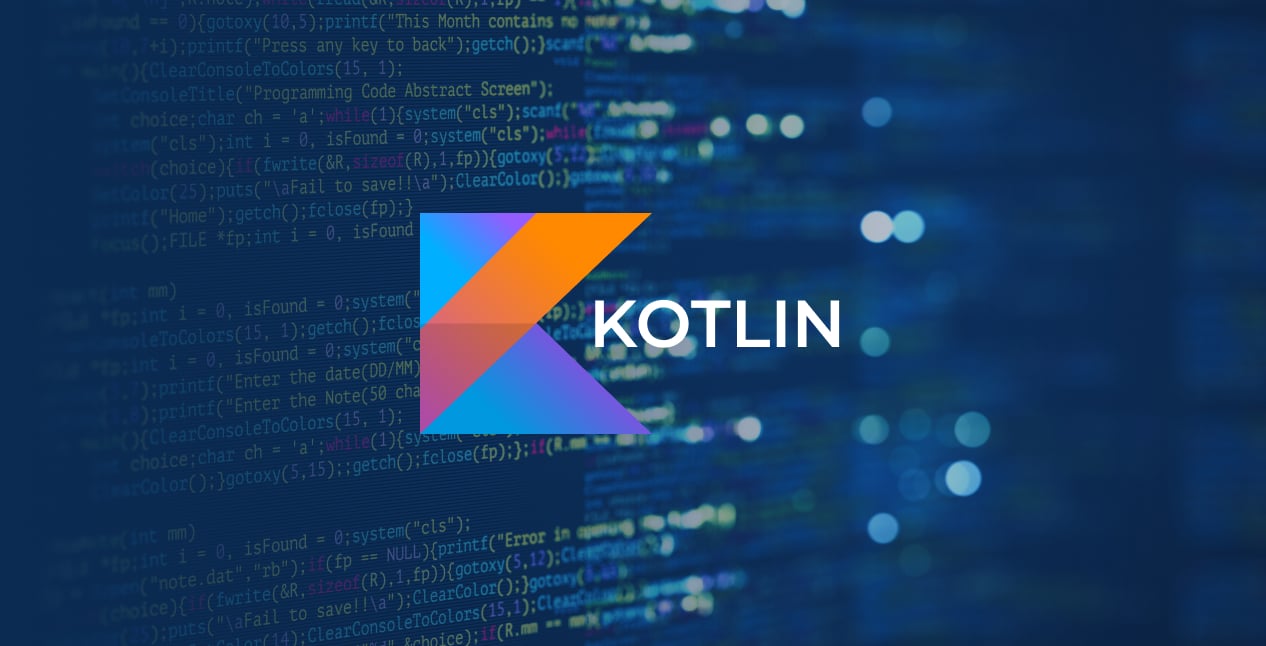-
What is Kotlin? Who developed it?
-
12 Interesting Facts You Must Know About Kotlin
- 1. Kotlin is an Open-Source
- 2. Kotlin allows one to write less-code
- 3. Google announced its support for Kotlin
- 4. 100% Interoperability With Java
- 5. Steep learning curve
- 6. Kotlin- Is a hybrid Object-Oriented & Functional Language
- 7. Kotlin can be deployed for Server-Side Development
- 8. Null Safety In Kotlin
- 9. Kotlin is fully compatible with all Java-based frameworks & libraries
- 10. Extension Functions
- 11. In what ways can Kotlin be used?
- 12. Kotlin Setup
- Wrap up
Facts and figures about Kotlin: The first stable release of Kotlin 1.0 was unveiled by Jet Brains in the year 2016. In 2017, Google I/O leaped forward to publicize support for Kotlin. After Google’s proclamation, Kotlin was a preferred language for Android developers; it was trajected that over 60% of Android developers are leveraging this programming language for their projects.
What is Kotlin? Who developed it?
Kotlin is a modern general-purpose programming language available as an open source. It is licensed by Apache 2.0. The architect behind this intuitive programming language was JetBrains. Moreover, this company also developed other popular platforms like Java IDE – IntelliJ IDEA. Kotlin compiles with the Java Virtual Machine (JVM) bytecode which can be used side-by-side with Java.
12 Interesting Facts You Must Know About Kotlin
1. Kotlin is an Open-Source
At JetBrains, the developers were drained of Java’s complex verbosity-they wanted to develop a more concise language compatible with Java. In the initial beginning of the development progress, they opted to make Kotlin an open source instead of keeping it as an internal project. Moreover, the programming language didn’t focus much on profit from developers who leveraged it but expected to make gains from the additional supporting core products. Being open-source, a diverse Java community supports Kotlin with valuable feedback, allowing it to refine and advance.
2. Kotlin allows one to write less-code
Java is an intricate programming language where the developer writes the entire code in nuance. On the flip side, the Kotlin compiler is versatile enough to interpret and write much of the code autonomously. According to a survey, it helps developers to write at least 20% less code in Kotlin. Moreover, it lessens the boilerplate code and has competent type inference.
For instance, Kotlin can potentially infer types in variable declarations independently. This leads to streamlining and increasing developers’ efficiency & productivity. Kotlin manages routine things on its innate aptness; this allows the developer to focus on other essential aspects of the code.
3. Google announced its support for Kotlin
At I/O Annual Summit 2017, Google declared Kotlin as the official language supporting Android. It became Kotilin’s core foundation for survival in this digital realm.
There was an implicit risk, even after the post-official statement of Google about the possibility of developing Android apps leveraging Kotlin. If Google took the call to invade, changes to Android and apps coded in unsupported Kotlin language were likely to pose a lot of bugs, and there was a big chance of the app malfunctioning or contradicting developers’ intent.
It would have been futile to work on Kotlin if Google announced support for its languages like Go or Apple’s Swift. But Google’s announcement vanished, all the fears were laid to rest, and developers were no longer afraid to develop Kotlin apps.
4. 100% Interoperability With Java
The impressive feature of Kotlin is its 100% interoperability with Java. This means developers can obtain the codes from Java and Kotlin in the same project. Moreover, they can compile both perfectly. Post-compilation, it would be difficult to identify which parts are developed in Kotlin or Java.
On the other hand, if the developer has been working on a Java project, they can switch to Kotlin without writing the code from scratch. Another advantage of working with Kotlin is that developers can utilize vast Java commands, Java libraries, and Java frameworks in their Kotlin Projects.
5. Steep learning curve
Kotlin profoundly is an easy-to-learn language. Moreover, a fresher or a new user can find it as a friendly language. Reading the language reference, a developer can quickly grasp it in a few hours if they are familiar with Java. This is possible because it is equipped with lean and intuitive syntax customized for Java developers. It is a straightforward programming language. If Java programmers use Kotlin, they will likely find Kotlin’s syntax acquainted with Java.
Kotlin is developed inspired by several existing languages, such as Java, C#, JavaScript, Scala, and Groovy. It is crafted to be resilient enough so developers can comprehend, skim and adapt quickly. It is a user-friendly programming language, but the developer may require time to learn the more new-fangled features.
6. Kotlin- Is a hybrid Object-Oriented & Functional Language
Kotlin language is intuitive to outperform other programming languages. The language is developed to be both object-oriented and functional constructs. Therefore, it can be used in both Object Oriented and Functional Programming styles. Developers can also amalgamate the different elements from the two styles. If you are delving into functional programming, it has excellent features like higher-order functions, function types, and lambdas.
7. Kotlin can be deployed for Server-Side Development
Kotlin endorses the host with the deployment of server-side development; this is workable because it is 100% compatible with the JVM. Developers can deploy server-side-development with Kotlin while maintaining full compatibility with existing Java-based technology stacks. Several frameworks can be used, like Spring, Vert.x, Ktor, Kotlinx.html, etc.
Here is the official tutorial if you are interested in Heroku for server-side applications. If you want to write an AWS lambda product, here is a sample project for your reference.
8. Null Safety In Kotlin
Null safety in Kotlin is excellent. Kotlin’s development aims to eliminate the danger of null references from code. The developer can quickly eliminate NullPointerExceptions, as the Kotlin system refuses to compile code that tries to assign or return null. The Kotlin-type system can distinguish between nullable references and non-null references.
9. Kotlin is fully compatible with all Java-based frameworks & libraries
Kotlin programs can effortlessly use all the existing Java frameworks and libraries. Kotlin programs can also use all the sophisticated frameworks which rely on annotation processing. Kotlin language is interoperable and can be integrated seamlessly with Gradle, Maven, and other build systems.
10. Extension Functions
Kotlin enables extending a class with new functionality without inheriting or using any design pattern. Extension functions are the functions that help us expand the functionalities of classes without touching the code.
11. In what ways can Kotlin be used?
Developers can use Kotlin for any development like Client – side web, server-side, and Android. Android supports it, and hundreds of applications use Kotlin on Android. Kotlin is used for mobile and server-side applications, data science, client-side with JavaScript or JavaFX, and more. It is compatible with existing module systems such as AMD and CommonJS. Moreover, it can be used for any Java UI framework like Swing or JavaFX for desktop development.
12. Kotlin Setup
Both Android Studio and IntelliJ support Kotlin. To set up Kotlin, the developer needs to install the Kotlin plugin. This Kotlin plugin is bundled with Android Studio starting from version 3.0.
Kotlin is available for free. Therefore, developers don’t have to pay anything when they develop a project on it. Freshers or new Android developers should take up the language and experiment with it.
Wrap up
With Kotlin, programmers can write safer, more stable & reliable codes. Well-known companies like Pinterest, Square, Netflix, Swiggy, and Basecamp have been using Kotlin. More and more companies are now slowly moving towards Kotlin development. Now, talking about the more stable release of the upgraded version, it was Kotlin 1.8.0, which was published in the month of December 28, 2022. It was followed by new amendments in Koltin version 1.8.0, including Kotlin 1.8.10, Kotlin 1.8.20, and Kotlin 1.8.21. Moreover, Koltin has extensive community support of developers; new users can join the group to stay updated with ongoing concerns while using the platform. They will surely stay up to sort out the issues. Let us wait to check out more latest upgrades of Kotlin, till than developers can leverage it for developing intuitive applications and beyond!









